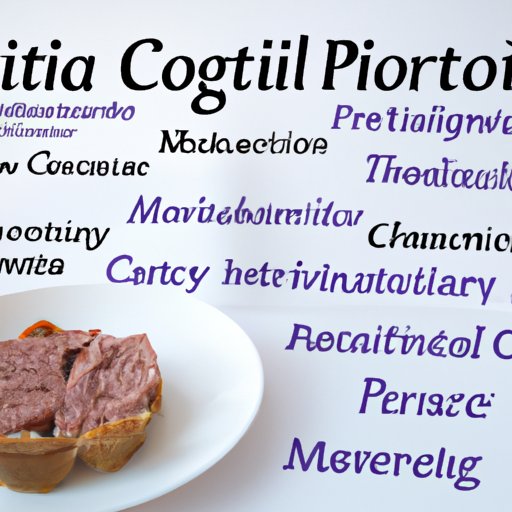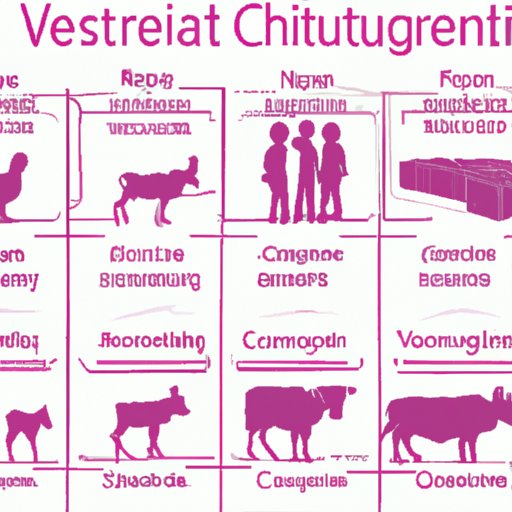Introduction
Cultured meat, also referred to as lab-grown or clean meat, is a type of food product created through cellular agriculture. This involves taking animal cells and culturing them in a laboratory environment to create edible products that are identical to their animal-based counterparts. The idea of cultured meat has been around since the 1930s, but it has only recently gained traction as an alternative to traditional animal-based meat. In this article, we will explore when cultured meat may be available to consumers, looking at the current status of the industry, the timeline for its potential availability, the challenges faced in its production and the benefits it could provide. We will also look at the regulatory environment, the role of technology and the economic and ethical implications.
A Timeline of the Development of Cultured Meat and When It May Be Available
The development of cultured meat has been rapid in recent years, with the first successful lab-grown hamburger being produced in 2013. Since then, there have been a number of advances in the technology used to produce cultured meat, including the use of 3D bioprinting to create complex structures. Despite these advances, there is still some way to go before lab-grown meat is available to consumers on a large scale.
The current status of the industry is that it is still in the early stages of development. There are a number of companies working on developing cultured meat products, but they have yet to reach the level of sophistication required to make them commercially viable. This means that it could be several years before cultured meat is available to consumers.
In order for cultured meat to become available, there are a number of steps that need to be taken. These include improving the efficiency of the production process, scaling up the technology to enable large-scale production, and ensuring that the product meets the necessary safety and quality standards. All of these steps will take time, but once they are completed, it is possible that cultured meat could be available to consumers within the next decade.
The Challenges Facing the Production of Cultured Meat and How They Are Being Overcome
The development of cultured meat faces a number of technical, regulatory, economic and ethical challenges. These must be overcome if the industry is to move forward and make its products available to consumers.
One of the main technical challenges facing the industry is the efficiency of the production process. Currently, the cost of producing cultured meat is much higher than that of traditional animal-based meat, making it difficult to make it commercially viable. Researchers are working on ways to improve the efficiency of the process, such as using stem cells from animals that are easier to culture, and using automated processes to reduce the labor involved. These developments could help to reduce the cost of production and make cultured meat more accessible.
Regulatory challenges also pose a significant obstacle to the development of cultured meat. Different countries have different regulations governing the production and sale of food, and many of these regulations are not designed with cultured meat in mind. As such, there is a need for governments to update their laws and regulations to ensure that cultured meat can be safely produced and sold to consumers.
The economic challenges associated with cultured meat are also considerable. Currently, the cost of producing cultured meat is much higher than that of traditional animal-based meat, making it difficult to make it commercially viable. This means that if cultured meat is to become available, it must be priced competitively with other types of meat. To do this, the cost of production must be reduced significantly, which will require further advancements in the technology used to produce it.
Finally, there are ethical considerations surrounding the production and consumption of cultured meat. Some people argue that it is unethical to produce food in a laboratory setting, while others believe that it could be beneficial for animal welfare and the environment. These arguments must be carefully considered before cultured meat is made available to consumers.
Fortunately, there are a number of solutions to these challenges that are being explored by researchers and companies in the industry. For example, a number of organizations are working on creating international standards for the production and sale of cultured meat, which could help to make it more widely available. Additionally, advances in the technology used to produce cultured meat could help to reduce its cost and make it more affordable for consumers.

Exploring the Potential Benefits of Cultured Meat and Its Place in the Food Industry
Aside from the technical, regulatory, economic and ethical challenges, there are also a number of potential benefits associated with the production and consumption of cultured meat. These include nutritional benefits, environmental benefits, animal welfare benefits and economic benefits.
Nutritionally, cultured meat could be beneficial as it is free from antibiotics and hormones, and could potentially contain higher levels of certain nutrients such as omega-3 fatty acids. Additionally, it could be tailored to meet specific dietary requirements, such as those of vegetarians and vegans. This could make it attractive to a wider range of consumers.
From an environmental perspective, cultured meat has the potential to reduce the amount of land, water and energy needed to produce food, as well as reducing greenhouse gas emissions. Additionally, it could reduce the amount of waste generated by the food industry, as it does not require the use of animals or animal products.
Animal welfare could also be improved through the production of cultured meat, as it does not require the use of animals for food production. This could help to reduce the suffering of animals used for food, and could potentially lead to better conditions for those that are kept in captivity.
Finally, cultured meat could have a positive impact on the economy. By reducing the cost of production, it could make meat more affordable for consumers, and could open up new markets for producers. Additionally, it could create jobs in the industry, as well as providing opportunities for investment.
An Overview of the Regulatory Environment Surrounding Cultured Meat and Its Availability
The regulatory environment surrounding the production and sale of cultured meat is still in its infancy. Different countries have different regulations governing the production and sale of food, and these regulations must be updated to accommodate cultured meat. Additionally, international bodies such as the World Health Organization (WHO) and the Food and Agriculture Organization (FAO) have a role to play in setting standards for the production and sale of cultured meat.
In the United States, the FDA has proposed a framework for regulating cultured meat, which would involve premarket approval and post-market surveillance. However, this framework is still in the early stages of development and has yet to be finalized. Similarly, in the European Union, the European Commission is currently working on a regulatory framework for cultured meat, although it is still in the early stages.

Investigating the Role of Technology in the Creation of Cultured Meat and Its Potential Impact
Technology plays an important role in the production of cultured meat, as it is used to culture the cells and create the desired product. Currently, most companies are using bioreactors to culture the cells, but there is potential for further advancements in the technology used. For example, 3D bioprinting could be used to create complex structures, such as steaks and burgers, and this could revolutionize the industry.
In addition to improving the production process, technology could also be used to improve the taste and texture of cultured meat. Companies are already experimenting with adding plant-based ingredients to give the product a more ‘meat-like’ taste, and this could help to make it more appealing to consumers. Additionally, technological advancements could help to reduce the cost of production, making it more affordable for consumers.
Finally, technology could be used to improve the traceability of cultured meat. By tracking the entire production process, it would be easier to ensure that the product meets the necessary safety and quality standards. This could help to increase consumer confidence in the product and make it more widely available.

Examining the Economic Implications of Cultured Meat and Its Availability
The economic implications of cultured meat are significant, as it could have a major impact on the food industry. Currently, the cost of producing cultured meat is much higher than that of traditional animal-based meat, making it difficult to make it commercially viable. This means that if cultured meat is to become available, it must be priced competitively with other types of meat. To do this, the cost of production must be reduced significantly, which could be achieved through advancements in the technology used to produce it.
Once the cost of production has been reduced, the price point for consumers must also be taken into consideration. If the price is too high, then consumers may not be willing to purchase it. On the other hand, if the price is too low, then it could have a negative impact on other industries, such as the traditional meat industry.
Finally, the availability of cultured meat could also have an impact on other industries, such as the agricultural sector. If cultured meat becomes widely available, then it could reduce the demand for traditional animal-based meat, which could have a detrimental effect on farmers and other workers in the industry.

The Ethical Debate Around Cultured Meat and Its Availability
The ethical implications of cultured meat are complex, and there are a number of arguments both for and against its production and consumption. On the one hand, it could be argued that it is unethical to produce food in a laboratory setting, as it is unnatural and could potentially lead to the exploitation of animals. On the other hand, it could be argued that it is more ethical than traditional animal-based meat, as it does not involve the use of animals for food production and could reduce the suffering of animals kept in captivity.
Ultimately, the decision of whether or not to consume cultured meat will come down to personal choice. Consumers must weigh up the potential benefits and risks before deciding whether or not to purchase it. Additionally, they must consider the ethical implications of their decision and ensure that they are comfortable with it.
Conclusion
In conclusion, while cultured meat is still in the early stages of development, it has the potential to revolutionize the food industry. It could provide nutritional, environmental, animal welfare and economic benefits, and could be made available to consumers within the next decade. However, there are a number of challenges that must be overcome before this can happen, including technical, regulatory, economic and ethical challenges. Additionally, the role of technology and the economic and ethical implications of its availability must be considered. Ultimately, the decision of whether or not to consume cultured meat will come down to personal choice, and consumers must weigh up the potential benefits and risks before deciding.
(Note: Is this article not meeting your expectations? Do you have knowledge or insights to share? Unlock new opportunities and expand your reach by joining our authors team. Click Registration to join us and share your expertise with our readers.)
